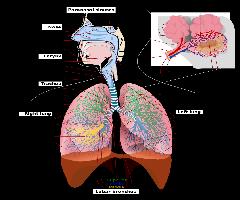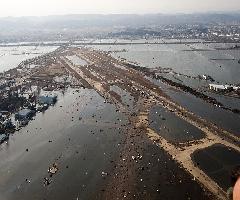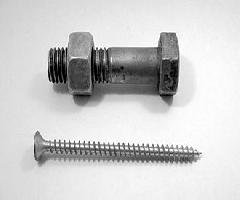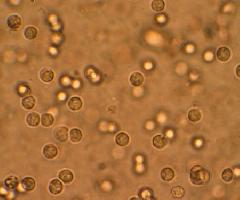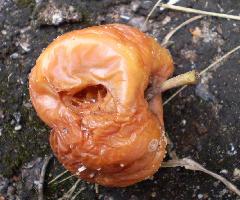Chemical substances have many uses. But did you know that the chemical substances can also be harmful? Chemical substances can cause pollution of our environment.
Land Pollution
Land pollution means destroying the quality of soil used for agriculture. Soil is polluted when its topmost layer is destroyed. This happens when farmers use too much fertilizer and pesticide. These are chemical substances that kill the tiny animals and other organisms in the soil which feed on the remains of dead plants and animals. Without them, the soil cannot get the nutrients from dead plants and animals that it needs to be productive.
Soil is
also polluted when it becomes salty. This happens when seawater seeps into the land. When the water evaporates, it leaves salt in the soil. Poisonous wastes from mines and some factories also pollute the soil.Water Pollution
Observe the water that comes out of your faucet. Does it look clear? Does it have a foul smell? If so, then the water is polluted. Water becomes polluted when it is contaminated by poisonous chemicals, sewage and other substances. The sources of water pollution are our homes, factories, farm chemicals, sewage and other substances.
Some electrical plants drain clean but heated water into the rivers or other waterways. This heated water reduces the amount of oxygen in the water. With less oxygen in the water, fish and other animals living in the water will die. Plants in the water will die, too.
Air Pollution
Air is a mixture of gases. Tiny particles of matter are also present in the air. When factories and vehicles burn fuel, they release more gases and tiny solid particles into the air. When some gases mix with other substances in the air, some poisonous gases are produced. The same thing happens when people burn their garbage.
Also, volcanic ash, substances from aerosol can and Freon from air conditioner and refrigerator manufacturing pollute the air. The presence of harmful gases and tiny solid particles lower the quality of the air we breathe. Children and old persons are the most affected by polluted air.
Effects of Pollution
When soil and water are polluted, food supply will be less. Less food supply can affect people's health. Air pollution can aggravate asthma and other respiratory diseases. It can also cause lung cancer. Smog can cause headache and irritation of the respiratory tract and eyes. It may also cause death.
Acid rain is a mixture of rain and some harmful gases in the air. When acid rain falls on lakes and rivers, fish and other water animals are killed. When acid rain seeps into the soil, it can damage plant crops and destroy forests. A very warm air that
results when some gases trap heat can cause diseases in animals and in plants. We use chemical substances such as kerosene, insecticides, detergent and many others. Improper handling of these substances can contribute to pollution and do harm to living things.Preventing Pollution
Preventing Pollution may seem difficult to do because most pollution is caused by things we use for protection and for comfort. However, we can do some things in our homes to help lessen pollution.
Reduce . To reduce, here means to use less of something. Use less plastic packaging materials that only end up as garbage. Use less electricity by turning off electrical appliances when not in use. Walk or ride a bike when traveling short distances.
Reuse . To reuse here means to use something as many times as it is usable. Examples of things that can be reused are old clothes, plastic bags, boxes, bottles and tin cans. This will help in reducing garbage.
Recycle . To recycle here means to convert used material into other useful things. Decorate bottles or cans to be used as flower vases or pencil holders. Make special paper from old newspapers. Make decorative items from cartons, plastics and bottle caps. Make compost from garbage and use it to fertilize soil.
How to make a Compost
We can also help lessen pollution by making good use of the garbage generated in our homes. How?
1. Get a plastic garbage can, soil, grass, kitchen waste, earthworms and dry leaves.
2. Make holes on the sides and cover of the garbage can.
3. Line the bottom of the can with a mixture of soil and grass cuttings.
4. Add the kitchen waste (chopped into pieces). Top this with chopped dry leaves.
5. Put some soil on top of the leaves. Then add some earthworms. Then put the lid of the can.
6. Place the garbage can where there is sunlight.
7. Keep the contents of the can damp and mix them from time to time.
In about four or five weeks time, you can put your compost in your flower pots or vegetable garden.
note: originally posted at Exposeknowledge.com under the same author.
